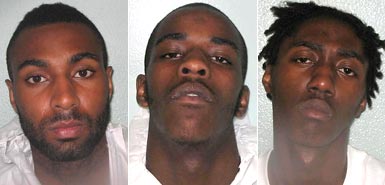|
English Language
|
Language of the street

This transcript
is of the language of three men who were convicted of killing Ben Kinsella
in London in June 2008.
The recordings were used in evidence at their trial and were published
in The
Times in June 2009.
A glossary follows.
Kika: The thing that they're
p****d about, yeah, that none of us was talking. None of us bust
our stories. That's why they are p****d. You feel me? |
The Times article comments:
"The recordings ... give a rare insight into the mindset of three young men involved in street drug crime, immersed in American rap music and believing that the slightest loss of face should provoke revenge of the utmost severity."
| Blood: brother, usually from the
same gang or area Boyden or Feds: police Ghost: to leave area or hide something, similar to "outta here" Shivved and bagged: arrested For real: approval of what has just been stated Endz or hood: a neighbourhood, the streets Crib: home Bless: approval of something good, or goodbye. You feel me?: Do you understand Buggin': to freak out, panic Mandem: men, often from another gang or 'hood' G's: thousands of dollars or pounds Evi: police evidence Shanked: stabbed To bust case: to walk free from court Hold it down: keep quiet Swif: a promiscuous male Boat: face, from the Cockney Slang 'boat race — face' |
What is the purpose of this use of language?
Group bonding? Secretive communication? Identification with a group to which they aspire? Presentation of image?
What is the effect of this use of language?
Confidence from group bonding? Generating fear in others? Creating a sense of strength and coonfidence?
The Times article says: "When Braithwaite gave evidence he dropped the 'street' tones and was well spoken. He said he was speaking that way in the police van to keep face with the other defendants."
What is your view on this? Does it change the way we see Braithwaite? In what way?
|
|